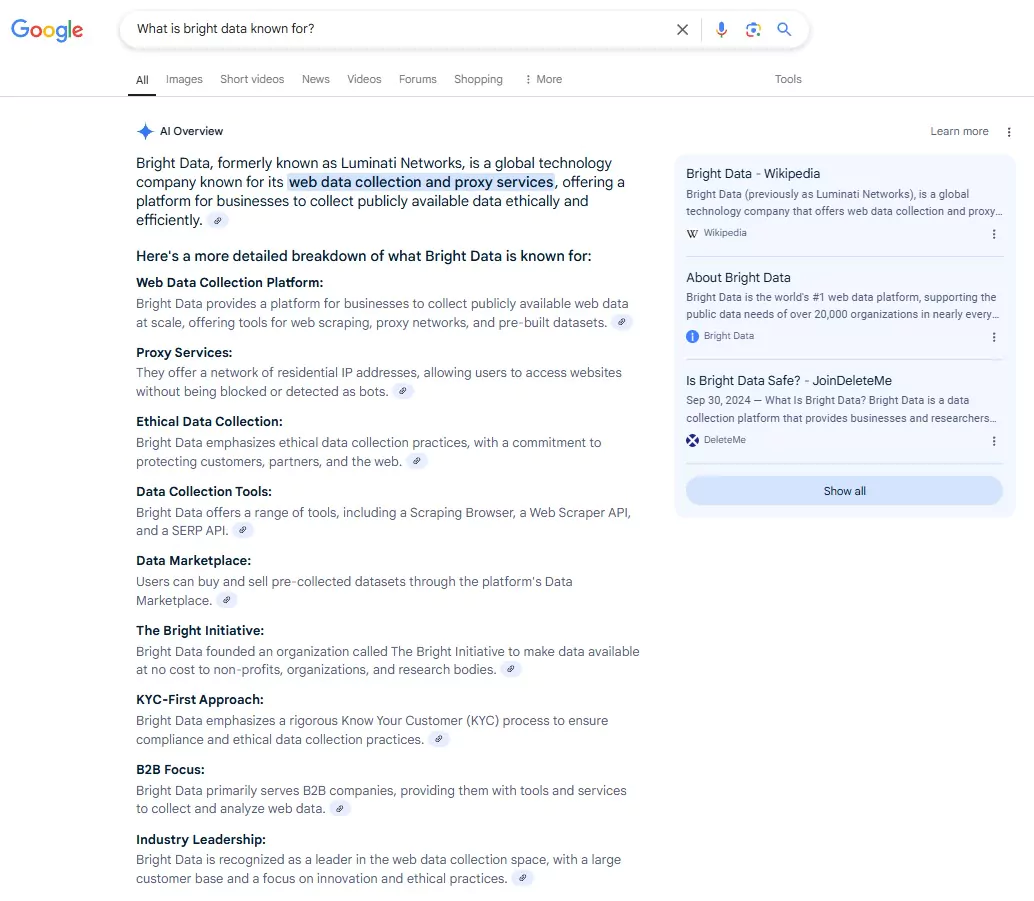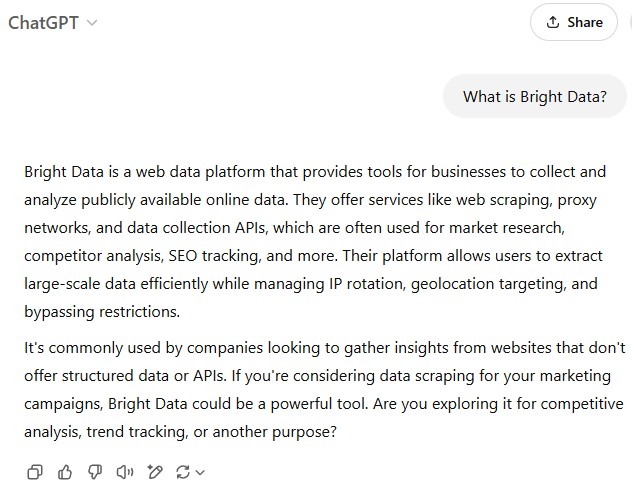Google AIO: 4 Ways To Find Out If Your Brand Is Visible In Generative AI [With Prompts]

Author: Super Admin
Published On: 12 March, 2025

This post was sponsored by Bright Data. The opinions expressed in this article are the sponsor’s own.
Imagine this in the time of Google AIO: A potential customer asks Google Gemini, ChatGPT, or Perplexity AI for the best SEO tools, top e-commerce platforms, or leading digital agencies.
Your brand has dominated traditional search rankings for years. But your company isn’t mentioned when AI generates an answer.
No ranking. No link. No Google AIO visibility.
This is the new reality of AI-driven search, and most SEOs aren’t tracking it.
Your brand might be invisible in AI search. Find out if it is now →
For years, you may have relied on keyword rankings, organic traffic, and SERP features to measure success.
But as AI-powered search engines reshape how information is delivered, these traditional SEO tracking methods are no longer enough.
How can brands ensure they are visible, accurately represented, and competitive if AI-generated answers influence user decisions without linking to websites?
With new challenges come new solutions. As AI answer engines continue to evolve, SEO professionals and rank tracking platforms must adapt by finding ways to monitor AI-generated search results in real time.
The ability to track brand mentions, analyze AI-driven recommendations, and compare competitor visibility is becoming just as critical as traditional keyword tracking.
In this article, we’ll explore:
For years, SEO tracking has revolved around keyword rankings, organic traffic, and SERP features like featured snippets and People Also Ask (PAA).
However, AI-generated search results don’t follow these traditional ranking structures.
In a standard Google search, ranking in the top three positions means high visibility and traffic. But in AI-generated search, there are no numbered rankings, just a synthesized response that may or may not include your brand.
For example, if a user asks “What are the best SEO tools?”, Google Gemini or ChatGPT might generate a list of tools based on their training data and real-time web sources.
If your brand isn’t included in that response, you’re invisible to the user, regardless of how well you rank in traditional search.
Without a way to track how AI search engines mention brands, you may be flying blind, and rank tracking tools are missing a critical data layer.
Tracking AI-generated search results isn’t as simple as checking keyword rankings.
Since AI models don’t rank pages but generate answers, you have to rethink what they measure.
Here are the four key query types that can reveal how AI search engines perceive and present your brand:
If AI answer engines don’t mention your brand when users ask about your industry, you’re invisible in AI search.
Even worse, if they misrepresent your brand, you could be losing trust without realizing it.
For example, if a user asks “What is [Your Brand] known for?”, the AI’s response could shape public perception. If it pulls outdated or incorrect information, you need to intervene.
 Screenshot from Google, March 11, 2025
Screenshot from Google, March 11, 2025 Screenshot from ChatGPT, March 11, 2025
Screenshot from ChatGPT, March 11, 2025AI-generated search results frequently generate list-based recommendations like:
If your brand doesn’t appear in these AI-generated lists, you’re missing out on potential customers who rely on AI search for recommendations.
AI search engines dynamically compare brands, often answering queries like:
If AI consistently recommends a competitor over your brand, you need to adjust your positioning and content strategy to improve your AI search presence.
Try it!
Pick a prompt from above and visit:
Bright Data provides the data collection infrastructure that can extract AI-generated search data for:
By leveraging Bright Data’s Web Scraper API, you can gain visibility into AI search, ensuring you stay ahead in an evolving search landscape.
As AI-generated search results become more dominant, SEO’s are already demanding AI search tracking capabilities from their tools, and rank tracking platforms must evolve to meet this need.
AI search tracking is no longer optional, it’s essential.
Bright Data’s Web Scraper API provides the data collection infrastructure that enables brands and SEO platforms to monitor their presence in AI-generated search results across multiple platforms.
🔗 Explore Bright Data’s Web Scraper API
🔗 Read more on optimizing for generative AI search
Image Credits
Featured Image: Image by Bright Data. Used with permission.